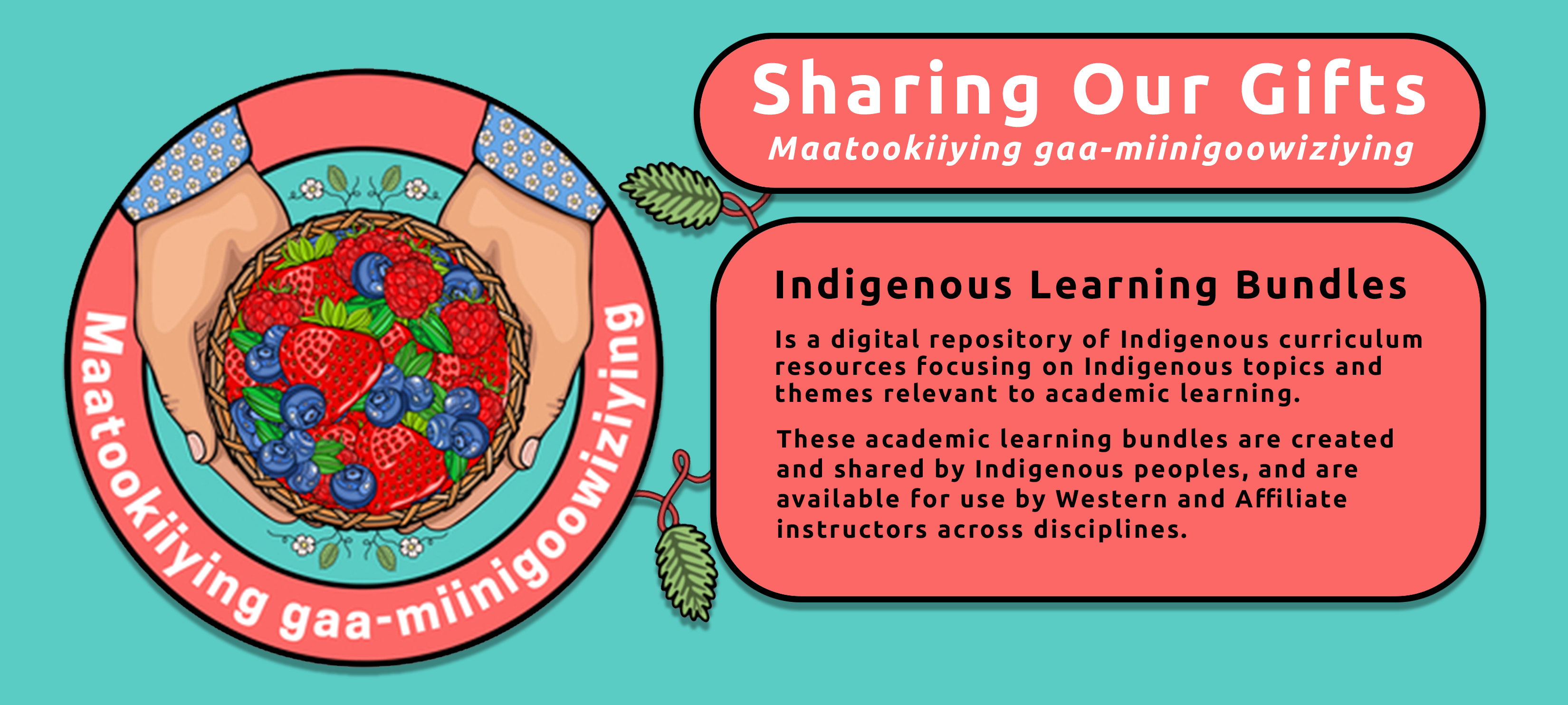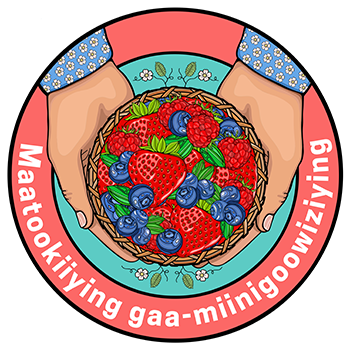Learning and Unlearning
Media coverage
Western University opens Wampum Learning Lodge with Indigenous focus on campus
Global News - November 7, 2022
A place for Indigenous students and allies, Wampum Learning Lodge opens at Western University
CTV London - November 7, 2022
New Wampum Learning Lodge a 'home away from home' for Indigenous students at Western
CBC News - November 7, 2022
Western opens Wampum Learning Lodge
Western News - November 7, 2022
Maatookiiying gaa-miinigoowiziying (Sharing Our Gifts)

TO PREVIEW THE INDIGENOUS LEARNING BUNDLES AND LEARN HOW TO ENGAGE WITH THEM IN YOUR COURSE CURRICULUM
WHAT IS MAATOOKIIYING GAA-MIINIGOOWIZIYING?
Maatookiiying gaa-miinigoowiziying (Sharing our Gifts) is a digital curriculum resource project designed to support Western and Affiliate instructors in culturally and ethically responsive ways to include local Indigenous knowledges, perspectives and voices in their undergraduate and graduate level courses. Inspired by Carleton University’s Collaborative Indigenous Learning Bundles , Maatookiiying gaa-miinigoowiziying offers a selection of Indigenous-led learning bundles (equivalent to one lesson) that center on Indigenous topics or themes, while privileging Indigenous conceptions, theories, ways of knowing, and epistemologies.
Listen to the audio:
Pronunciation of Maatookiiying gaa-miinigoowiziying (Sharing our Gifts)
Each Bundle is a Gift
Encapsulated within the project’s Anishnabemowin (Ojibwe language) name: Maatookiiying gaa-miinigoowiziying (Sharing our Gifts), each learning bundle is a gift from Indigenous lead collaborators to Western instructors and imbued with ethical responsibilities for working with and sharing Indigenous collective knowledges. These responsibilities include the completion of an orientation, the provision of feedback (instructor and student), and a commitment to ongoing and collaborative learning. We encourage you to watch the short video below to learn more.
Available Bundles
- Orientation to Indigenous Knowledges (Lead Collaborator: Candace Brunette-Debassige)
- Indigenous Lands, Spaces and Places (Lead Collaborator: Sakihitowin Awasis)
- Indigenous and Black Solidarities (Lead Collaborator: Erica Neeganagwedgin)
- Indigenous Leadership (Lead Collaborator: Candace Brunette-Debassige)
- Indigenous Women and Resilience (Lead Collaborator: Jennifer Komorowski)
- Indigenous Storytelling and Media Representation (Lead Collaborator: Sara Mai Chitty)
- Indigenous Sovereignty: Data, Governance, Justice, and the Land (Lead Collaborator: Robyn Rowe)
- Indigenous Research (Lead Collaborator: Candace Brunette-Debassige) COMING SOON!
- Indigenous Research Methods (Lead Collaborator: Candace Brunette-Debassige) COMING SOON!
- Indigenous Resistances (Lead Collaborator: Melissa Schnarr) IN DEVELOPMENT!
- Indigenous Climate Change (Lead Collaborator: Sara Mai Chitty) IN DEVELOPMENT!
What does a bundle include?
Each learning bundle consists of:
- a list of learning outcomes for the bundle;
- a video lecture, or series of shorter vignettes presented by the Lead Collaborator (may take various forms including video lectures, PowerPoint presentations, and/or video/audio clips)
- a video recording of a visit with an Indigenous Elder, Indigenous Knowledge Holder, or Indigenous specialist in the topic area in conversation-style;
- a list of recommended teaching prompts for instructors and students to take up presentations more deeply;
- a sample list of classroom and online instructional strategies relevant to the Bundle;
- a list of academic readings instructors can draw upon to deepen student learning at the undergraduate and graduate levels;
- a list of suggested assignments, assessments, and other relevant resources.
Who can use the bundles?
The learning bundles are available exclusively to Western and Affiliate instructors. If you wish to use the bundles outside of Western University (for example, a hybrid course with another university), please contact us directly at indigenousbundles@uwo.ca to discuss.
What happens when I register?
Registering allows you access to our OWL site where you will find:
- a description of each bundle
- a short video snapshot or each bundle
- collaborator biographies
- knowledge Holder biographies
- learning outcomes
If you decide to use a bundle in your course curriculum, this site will also provide you with instructions on how to proceed.
Are there supports available to guide me as I engage with the bundles in my coursework?
Yes! We have several supports available.
Logistical: Our support team is available to guide you in importing the bundles into your course sites once you are ready to move forward. You will find instructions on our OWL site.
Community of Practice: We strongly encourage all instructors using the bundles to sign up for the Maatookiiying gaa-miinigoowiziying Community of Practice (CoP). More details about our CoP may be found on our OWL site.
Pedagogical: For questions specifically related to pedagogical approaches and assessments, you may contact the Sara Mai Chitty, Indigenous Pedagogy Advisor.
Additional Supports: We are also pleased to provide additional supportive learning resources you may find helpful in your own journey of learning prior to engaging with the bundles including online courses and modules, publications. You may find these resources on our OWL site.
The Office of Indigenous Initiatives also offers many opportunities to learn and build relationships. You can subscribe to their newsletter here , and follow them on social media .
Are the bundles available for staff/instructor professional development?
The learning bundles are intended to be used specifically within undergraduate and graduate level curriculum. That said, we understand that staff and instructors are learners too! We respectfully ask that you contact us first at indigenousbundles@uwo.ca prior to engaging with the bundles for professional development purposes.
I am having trouble registering, please help!
The learning bundles are available exclusively to Western and Affiliate instructors. As such, you will not be able to register with a non-@uwo.ca email/username. If you are still having trouble registering, please contact us at indigenousbundles@uwo.ca
Will the bundles transition to Brightspace?
Yes! The bundles will transition to Brightspace. We are working behind the scenes to prepare and will update registered users when this transition is ready to begin.
Questions? Please contact: indigenousbundles@uwo.ca

